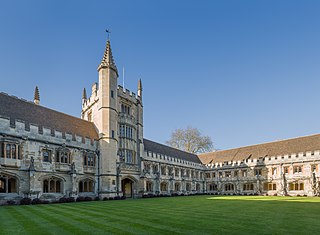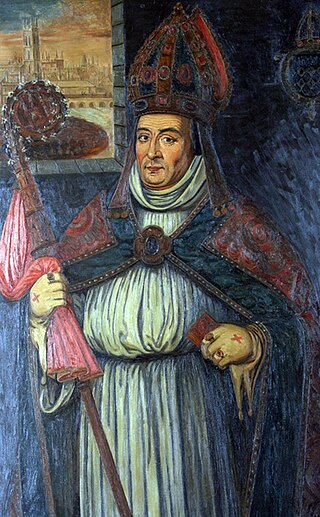Related Research Articles

Magdalen College is a constituent college of the University of Oxford. It was founded in 1458 by Bishop of Winchester William of Waynflete. It is one of the wealthiest Oxford colleges, as of 2022, and one of the strongest academically, setting the record for the highest Norrington Score in 2010 and topping the table twice since then. It is home to several of the university's distinguished chairs, including the Agnelli-Serena Professorship, the Sherardian Professorship, and the four Waynflete Professorships.

William Waynflete, born William Patten, was Headmaster of Winchester College (1429–1441), Provost of Eton College (1442–1447), Bishop of Winchester (1447–1486) and Lord Chancellor of England (1456–1460). He founded Magdalen College, Oxford, and three subsidiary schools, namely Magdalen College School in Oxford, Magdalen College School, Brackley in Northamptonshire and Wainfleet All Saints in Lincolnshire.

Lawrence Humphrey DD was an English theologian, who was President of Magdalen College, Oxford, and Dean successively of Gloucester and Winchester.
Theophilus Gale (1628–1678) was an English educationalist, nonconformist and theologian of dissent.
A demyship characterises a form of scholarship or research affiliation at Magdalen College, Oxford.
Samuel Parker was an English churchman, of strong Erastian views and a fierce opponent of Dissenters. His political position is often compared with that of Thomas Hobbes, but there are also clear differences; he was also called in his time a Latitudinarian, but this is not something on which modern scholars are agreed. During the reign of King James II he served as Bishop of Oxford, and was considered by James to be a moderate in his attitude to Catholics.

John Piers (Peirse) was Archbishop of York between 1589 and 1594. Previous to that he had been Bishop of Rochester and Bishop of Salisbury.
Baptist Levinz, sometimes Baptiste or Baptist Levinge, was an Anglican churchman. He is known as a bishop and also for the part he played in the dramatic election at Magdalen College, Oxford.
Henry Wilkinson (1610–1675) was an English clergyman, in the Commonwealth period a canon of Christ Church, Oxford, Lady Margaret Professor of Divinity, and member of the Westminster Assembly. Later he was a nonconformist preacher.
Thomas Pierce or Peirse (1622–1691) was an English churchman and controversialist, a high-handed President of Magdalen College, Oxford, and Dean of Salisbury.
John Oliver (1601–1661) was an English royalist churchman, President of Magdalen College, Oxford, and Dean of Worcester.
John Parkhurst (1564–1639) was an English clergyman and academic, master of Balliol College, Oxford, from 1617.
Nicholas Bond (1540–1608) was an English churchman and academic, President of Magdalen College, Oxford, from 1590.
William Lyford (1598–1653) was an English nonconformist clergyman, elected to the Westminster Assembly though not sitting in it.
John Wallis was Laudian Professor of Arabic at the University of Oxford from 1703 until his death.
John Rouse Bloxam (1807–1891) was an English academic and clergyman, the historian of Magdalen College, Oxford.
Gerbrand Harkes was a Dutch Protestant who became a bookseller and dealer in manuscripts in England.
William Symonds D.D. was an English clergyman, known as a promoter of the Colony of Virginia. The arguments of Symonds in favour of the colony in 1609, equating the British nation with the biblical Abraham, and stating that Native Americans lacked property rights, have been seen as presaging later developments in the colonisation of North America.
Henry Bull was an English Protestant theological writer. He is now remembered as an ally of John Foxe in documenting the Marian exiles and recent religious history.
Edward Reynolds was an English Anglican priest in the 17th century.
References
- "Harding, John (HRDN584J)". A Cambridge Alumni Database. University of Cambridge.
- ↑ John Rouse Bloxam, A register of the presidents, fellows, demies, instructors in grammar and in music, chaplains, clerks, choristers, and other members of Saint Mary Magdalen College in the University of Oxford, from the foundation of the College to the present time (1853)
- ↑ Oxford Dictionary of National Biography , Harding, John (bap. 1601, d. 1665), alchemist and translator by Peter K. Benbow.
